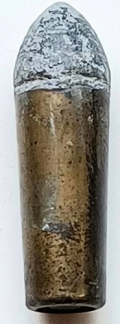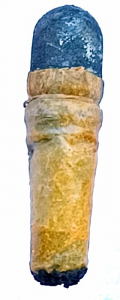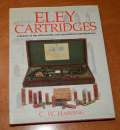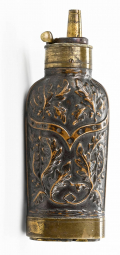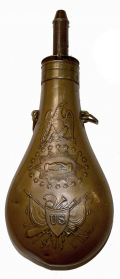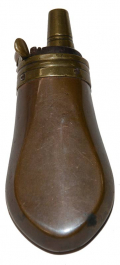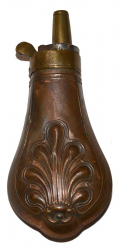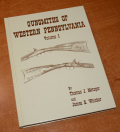site search
online catalog
Firearms
Showing 221 to 240 out of 294
VERY SCARCE 1799-1800 SWAN CONTRACT VIRGINIA MILITIA REGIMENTALLY MARKED MUSKET: 42nd REGIMENT, PITTSYLVANIA
This musket is stamped “42. VA. REGT. PITTSYLVANIA” on the barrel, was later altered to percussion and then shortened for use in the civilian market. It is a scarce survivor from muskets delivered… (1000-241). Learn More »
MODEL 1841 HALL BREECHLOADING RIFLE: A SCARCE RIFLE, MADE IN PERCUSSION, AND THE LAST OF THE BREED
The breechloading Model 1841 Hall rifle retained the .52 caliber 32 5/8” rifled barrel of the Model 1819, but finally caught up with Hall carbines in the use of percussion priming. These are fairly… (490-3498). Learn More »
THUER’S PATENT .36 CALIBER “POCKET NAVY” CARTRIDGE
This is a Thuer’s Patent metallic centerfire cartridge. This short .36 caliber cartridge is in excellent original condition and was for the Colt Thuer conversion “Pocket Navy” revolver. These… (1212-24). Learn More »
REPRODUCTION SET OF CRISPIN CARTRIDGES
This is a cased display set of reproduction Crispin cartridges as given out at the 2005 California Cartridge Collectors Show. Foam-filled plastic case holds five different Crispin cartridges made for… (1212-251). Learn More »
SCARCE MODEL 1841 SPRINGFIELD CADET MUSKET, DATED 1844
Model 1841 Cadet Musket was produced at Springfield Armory between 1844 and 1845. This is one of only 450 of these weapons produced. Intended for the Corps of Cadets at West Point. This is a .57… (1000-138). Learn More »
$6,800.00
Originally $8,500.00
CONFEDERATE CONVERSION OF A MODEL 1816 SPRINGFIELD MUSKET
This weapon is a single shot, muzzle loading, .69 caliber smoothbore musket manufactured at the US armory in Springfield. Originally produced as a flintlock it was converted to percussion by the… (1000-114). Learn More »
$2,000.00
Originally $2,500.00
SOLD
90-BORE (~.36 CALIBER) SHARPS “SPORTING RIFLE” CARTRIDGE
This style of cartridge was originally made prior to the Civil War and eventually replaced in the North by the “New Model” linen cartridges. However, the simple method of just tying the plain… (1212-87). Learn More »
60-BORE (~.44 CALIBER) SHARPS CARTRIDGE, GOMEZ & MILLS PATENT
Here is a very rare 60-Bore Sharps cartridge with a multi-groove bullet by Gomez and Mills. This cartridge is in fine condition. The paper is crisp, and you can clearly see where another cartridge… (1212-85). Learn More »
VERY RARE .36 CALIBER SAVAGE “SKIN” CARTRIDGE
Scarce .36 caliber Savage cartridge for Navy revolvers. Here is a cartridge that is rarely offered for sale in this fine condition. This style of cartridge was made by D.C. Sage of Middletown, CT.… (1212-114). Learn More »
COPY OF “ELEY CARTIDGES” FROM THE LIBRARY OF THE LATE DEAN S. THOMAS
The full title of this volume is “ELEY CARTRIDGES: A HISTORY OF THE SILVERSMITHS AND AMMUNITION MANUFACTURERS” by C. W. Harding and published by Quiller Press of Wykey, Shrewsbury, England in… (236-469). Learn More »
ELEGANT DOUBLE COMPARTMENT PISTOL POWDER FLASK
This small pistol flask is embossed with an attractive pair of oak leaf and acorn clusters in the top quarter, below which a long, thin, scrolling chevron with dots separates it from a pair of knotted… (490-5380). Learn More »
1849 DATED MEXICAN WAR ERA BATTY “PEACE” POWDER FLASK
Brass powder flask in good condition. The body has one small ding at bottom with a small seam opening. The decoration on the flask consists of a spread-winged eagle above a circle of 20 five-pointed… (160-170). Learn More »
SMALL PISTOL POWDER FLASK
This is very small powder flask, possibly of European manufacture and perhaps made on contract for an American retailer, intended for a pocket revolver or small single shot pistol. Measures… (490-5248). Learn More »
MODEL 1858 CADET MUSKET DATED 1858
An original Springfield Model 1858 Cadet rifle musket in .58 caliber in nice condition. Metal surfaces appear to have been cleaned and are bright. The 38.00-inch barrel has a surface that wears a… (490-3489). Learn More »
SMALL PISTOL POWDER FLASK
This is very small powder flask, possibly of European manufacture and perhaps made on contract for an American retailer, intended for a pocket revolver or small single shot pistol. Measures… (490-5247). Learn More »
VOLUME 1 OF REFERENCE WORK CONCERNING WESTERN PENNSYLVANIA GUNSMITHS
Title is “GUNSMITHS OF WESTERN PENNSYLVANIA VOLUME 1” by Thomas J. Metzgar and James B. Whisker. Published by Old Bedford Village Press of Bedford, Pennsylvania in 1998. Volume is hardcover and… (798-74). Learn More »
BULLET MOLD FOR .31 CALIBER REVOLVER
Iron, two cavity bullet mold for the .31 caliber revolver. It casts one round ball and one elongated bullet. There is no sprue cutter. Cavities remain clean and crisp. There are several small dings on… (490-4365). Learn More »
BULLET MOLD FOR .31 CALIBER REVOLVER
Iron, two cavity bullet mold for the .31 caliber revolver. It casts one round ball and one elongated bullet. There is no sprue cutter. There are several small dings on exterior where the mold needed… (490-4364). Learn More »
BULLET MOLD FOR .31 CALIBER (120 GAUGE) ADAMS REVOLVER
Brass, two cavity bullet mold for 120 gauge (approx. .31 caliber) English Adams revolver. It casts two elongated bullets. These feature a pointy nose, two grooves, and a solid base. Iron sprue cutter… (490-4378). Learn More »
M-1855 MAINSPRING VISE FOR CONVERSION MUSKETS
Mainspring vise for the many types of early muskets that were converted to percussion ignition. Typical vise mechanism with offset bar to accommodate the older flintlock mainsprings. Excellent… (490-4363). Learn More »
Showing 221 to 240 out of 294
Most Popular
Historical Firearms Stolen From The National Civil War Museum In Harrisburg, Pa »
Theft From Gravesite Of Gen. John Reynolds »
Selection Of Unframed Prints By Don Troiani »
Fine Condition Brass Infantry Bugle Insignia »
featured item
REGULATION CIVIL WAR US ARMY ISSUE BLANKET IN AMAZING CONDITION
These wool blankets were an essential piece of a Union soldier's gear. This one is full length and unaltered. It measures 66 inches wide by 80 inches in length. The ends are finished on the sides, and they are basted over 1/2 inch on the long ends to… (2025-1850). Learn More »





